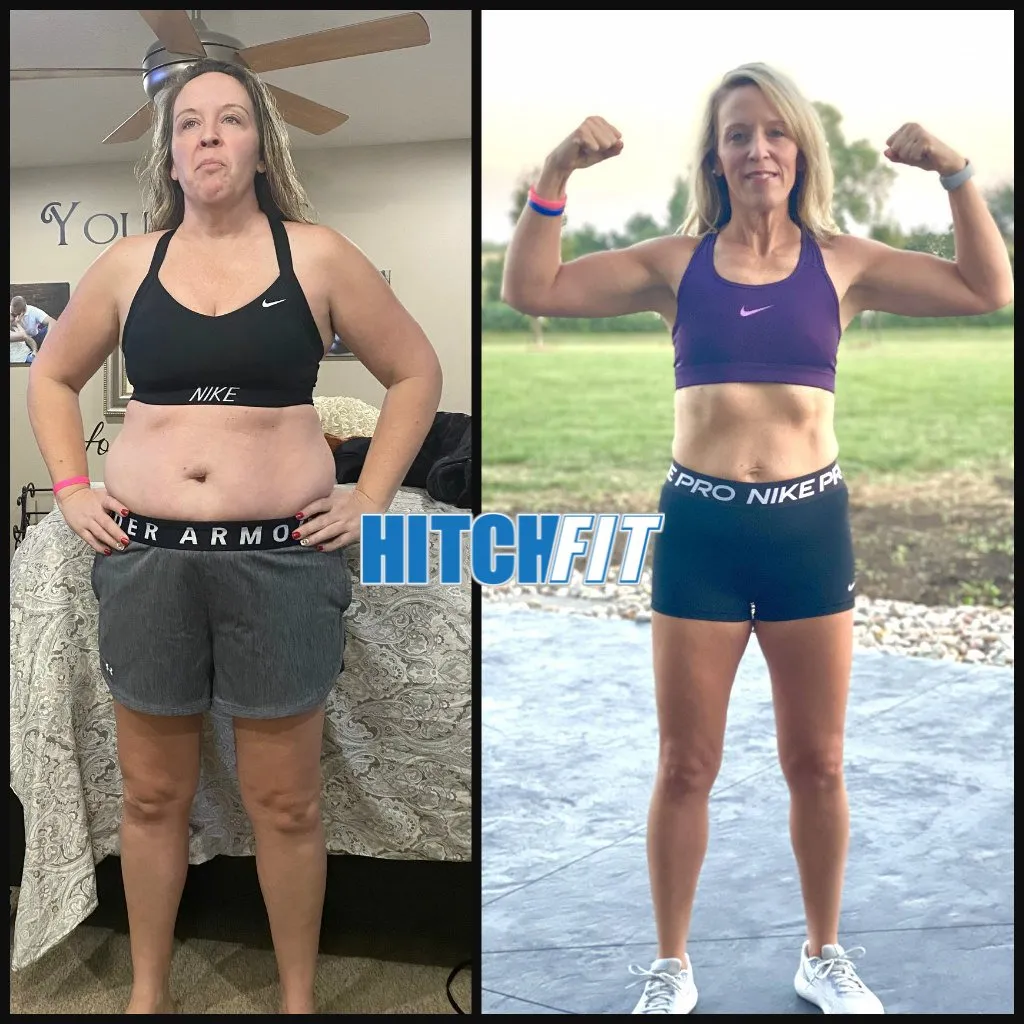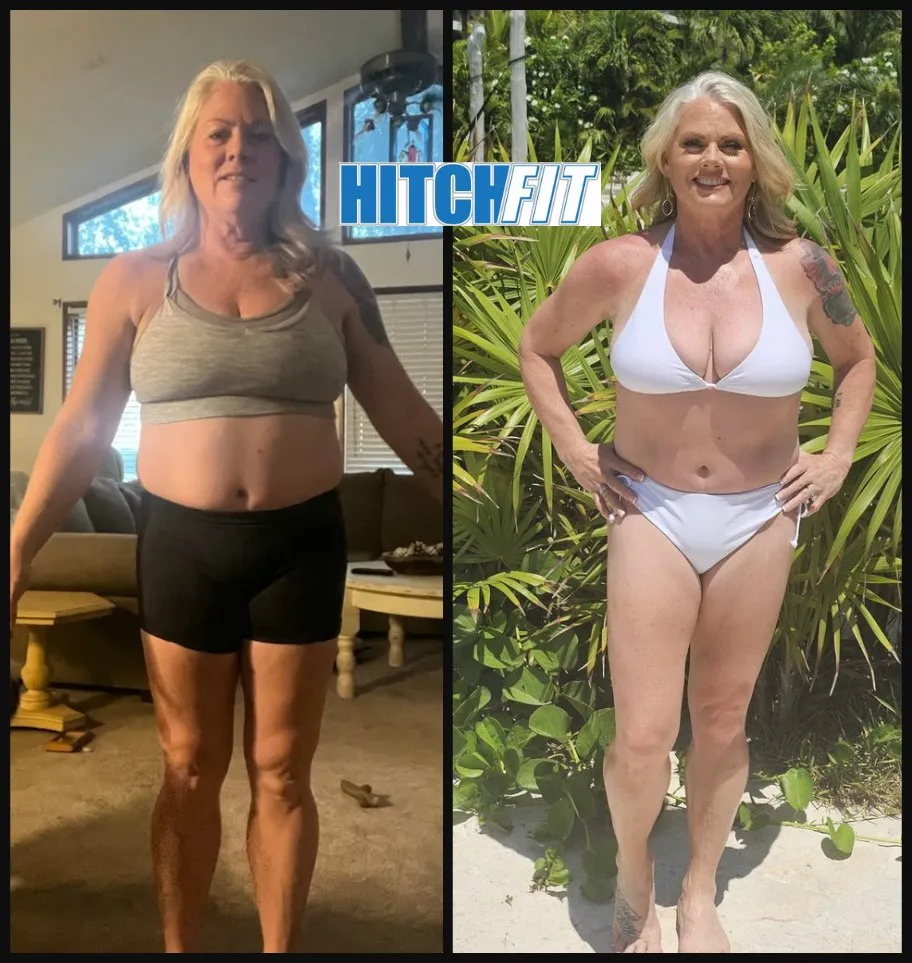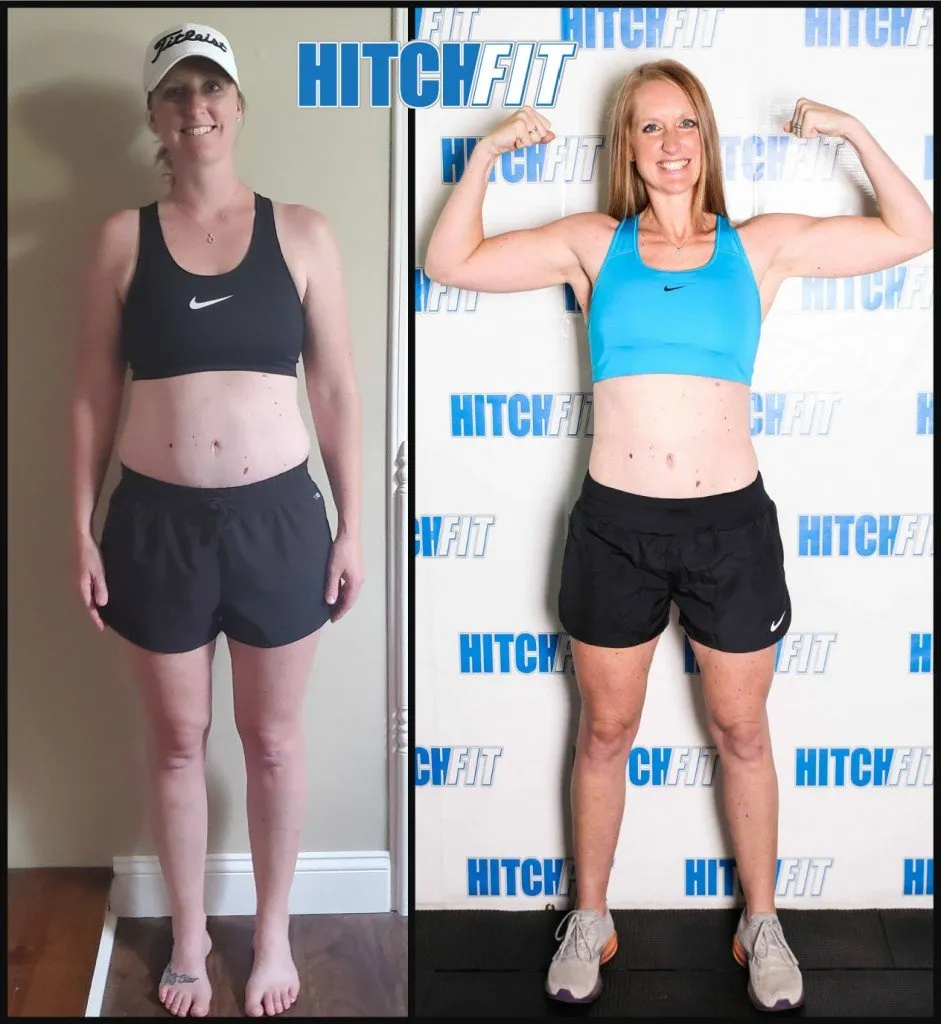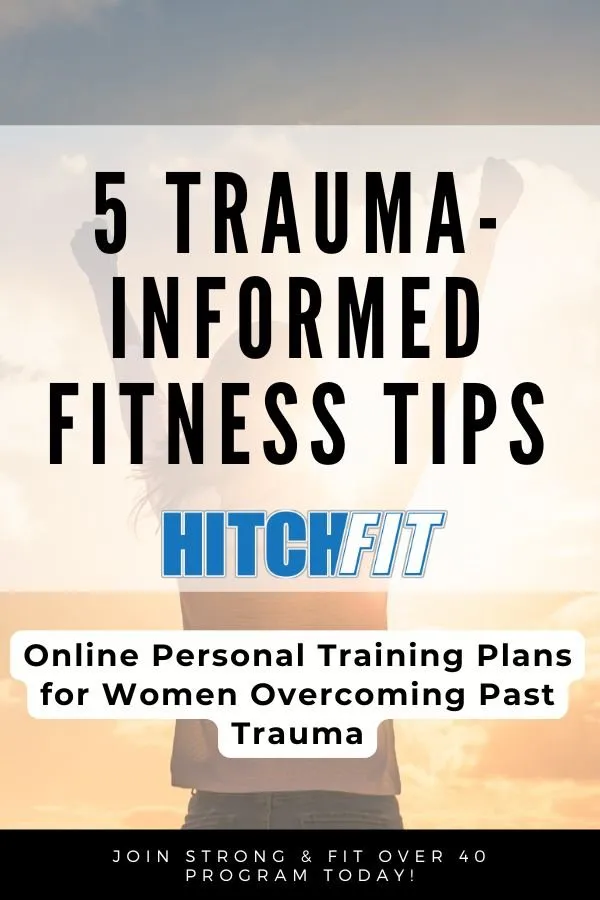A Trauma-Informed Path for Women Over 40
Overcoming Trauma Through Fitness: For women over 40, embarking on a fitness journey can feel like an uphill battle, especially when past trauma from the past casts a shadow over motivation, energy, and self-worth. Trauma can disrupt your body’s stress response, making weight loss, muscle building, or even sticking to a routine feel impossible. But here’s the empowering truth: with the right trauma-informed tools and strategies, you can overcome these barriers and transform your body and mind.
At Hitch Fit, our Strong & Fit Over 40 program, led by fitness expert and Trauma & Resilience Life Coach Diana Chaloux-LaCerte, helps women, just like you, reclaim their strength and confidence. Trauma from your past may have held you back from truly achieving your fitness goals, but that doesn’t have to be the case for your future. Overcoming Trauma through fitness and self-regulation skills is possible.
In this article, we’ll explore how trauma impacts fitness, share inspiring stories of women over 40 who’ve triumphed, and provide research-backed tips to guide you. Ready to heal and thrive? Let’s begin!
How Trauma Impacts Your Fitness Journey
Trauma, whether from childhood, relationships, or life events, leaves a lasting imprint on the body and brain. It dysregulates the nervous system, elevating cortisol and triggering a “fight, flight, or freeze” response that can sabotage fitness goals. A 2018 study in Psychoneuroendocrinology found that trauma survivors often experience heightened stress responses, leading to increased fat storage and reduced exercise adherence (Kiecolt-Glaser et al., 2018). For women over 40, this is compounded by hormonal shifts like declining estrogen, which can amplify fatigue, anxiety, and weight gain (Karvonen-Gutierrez & Kim, 2020).
Common challenges include:
Low Motivation: Trauma can sap energy, making workouts feel overwhelming.
Emotional Eating: Stress may drive cravings for comfort foods, derailing nutrition.
Self-Doubt: Negative self-perception can erode confidence to start or sustain fitness.
Physical Tension: Chronic stress from trauma can cause muscle tightness or pain, hindering exercise.
Yet, these obstacles are not permanent. With a trauma-informed approach—emphasizing safety, empowerment, and gradual progress—fitness becomes a powerful tool for healing and transformation.
Inspiring Transformations: Women Over 40 Healing Through Fitness
At Hitch Fit, we’ve witnessed women over 40 overcome trauma’s grip through our Fitness programs. Their stories inspire hope:
Shana, 42, carried the weight of past trauma from losing her daughter, and 50 extra pounds. Feeling stuck and defeated, she joined our program. With trauma-informed coaching, strength training, and nutrition guidance, Shana lost 50 pounds, built strength and resilience and started to step forward in life.

Marsha, 54, faced deep emotional wounds from trauma that left her disconnected from her body. Through our program’s gentle, trauma-sensitive workouts and personalized support, she lost nearly 20 pounds, gained strength, and found fitness as a part of her path to healing.

Jessica battled anxiety rooted in trauma, which made exercise intimidating. Our trauma-informed approach helped her embrace movement as medicine. She lost 20 pounds, overcame anxiety, and now thrives with a healthy lifestyle.

These women prove that trauma doesn’t have to define your fitness journey. With the right support, you can rewrite your story.
The Science: How Fitness Helps Heal Trauma
Exercise is a proven ally in overcoming trauma’s effects, particularly for women over 40. Here’s what research shows:
1. Regulates the Nervous System
Trauma often leaves the nervous system in overdrive, but exercise can restore balance. A 2020 study in Frontiers in Psychology found that regular physical activity, especially strength training and aerobic exercise, reduces cortisol levels and enhances vagal tone, promoting calm and resilience (Thoma et al., 2020). This helps women feel safe and grounded in their bodies.
2. Boosts Mood and Reduces Anxiety
Trauma can fuel anxiety and depression, but exercise counters this. A 2019 meta-analysis in Journal of Psychiatric Research showed that moderate-intensity exercise, like walking or resistance training, significantly reduces anxiety symptoms in trauma survivors (Stubbs et al., 2019). Endorphins from workouts act as natural mood-lifters.
3. Enhances Body Awareness and Confidence
Trauma can disconnect you from your body, but movement rebuilds that connection. A 2021 study in Body Image found that strength training improves body image and self-esteem in women over 40, helping them feel empowered (Anderson et al., 2021). This is key to overcoming self-doubt.
4. Supports Weight Loss and Hormonal Health
Trauma-driven cortisol spikes can lead to weight gain, especially during perimenopause. A 2022 study in Obesity confirmed that resistance training combined with aerobic exercise reduces visceral fat and improves insulin sensitivity in women over 40 (Hunter et al., 2022). This supports both physical and emotional health.
5 Trauma-Informed Fitness Tips for Women Over 40
Ready to start your journey? Here are five research-backed, trauma-informed strategies to succeed:

1. Start Small with Gentle Movement
Trauma can make high-intensity exercise feel overwhelming. Begin with low-impact activities like walking or bodyweight exercises (e.g., modified squats) to build confidence. A 2020 study in Trauma, Violence, & Abuse recommends gradual exposure to movement for trauma survivors (Nguyen et al., 2020). Our Strong & Fit Over 40 program starts where you are, ensuring safety and progress.
2. Prioritize Strength Training for Empowerment
Strength training builds physical and mental resilience. Aim for 2-3 sessions per week with exercises like lunges or dumbbell rows. Diana, your trauma-informed coach can design workouts to make you feel strong without triggering stress responses.
3. Nourish Your Body with Intention
Emotional eating is common with trauma, but balanced nutrition helps. Focus on 1.6-2.2 grams of protein per kilogram of body weight daily to support muscle and stabilize mood (Morton et al., 2018). Our Strong & Fit over 40 program includes trauma-sensitive meal plans to foster a healthy relationship with food.
4. Practice Self-Regulation Techniques
Incorporate breathwork or mindfulness before workouts to calm the nervous system. A 2019 study in Complementary Therapies in Medicine found that diaphragmatic breathing reduces stress in trauma survivors (Hopper et al., 2019). We weave these practices into your fitness routine for holistic healing.

5. Work with a Trauma-Informed Coach
A coach who understands trauma is essential. A 2021 study in Health Psychology found that personalized coaching doubles adherence to fitness goals in trauma survivors (Smith et al., 2021). Our Strong & Fit Over 40 program, led by Coach Diana, a certified Trauma and Resilience Life Coach, offers empathetic, tailored guidance to help you thrive.
Why Strong & Fit Over 40 is Your Path to Healing
The Strong & Fit Over 40 program at Hitch Fit is uniquely designed for women over 40 navigating trauma and hormonal changes. With a trauma-informed approach, we offer:
Safe, Personalized Workouts: Strength and cardio plans that respect your nervous system and build resilience.
Trauma-Sensitive Nutrition: Meal plans to nourish your body and mind without stress.
Empathetic Coaching: One-on-one support from Coach Diana, who integrates trauma-informed strategies to empower you.
Community Connection: A supportive network of women who understand your journey.
Like Shana, Marsha, and Jessica, you can transform your body and heal from within.

Start Your Healing Journey Today
Trauma may have shaped your past, but it doesn’t have to define your future. Women over 40 are rewriting their stories through fitness, and you can too. Join the Strong & Fit Over 40 program at Hitch Fit and let our trauma-informed coaching guide you to a stronger, more confident you. Visit Hitch Fit to learn more and take the first step toward healing and transformation!
References:
Anderson, C., et al. (2021). Strength training and body image in midlife women. Body Image, 38, 208-215.
Hopper, S. I., et al. (2019). Effectiveness of diaphragmatic breathing for reducing stress in trauma survivors. Complementary Therapies in Medicine, 47, 102192.
Hunter, G. R., et al. (2022). Exercise and metabolic health in women over 40. Obesity, 30(4), 789-797.
Karvonen-Gutierrez, C., & Kim, C. (2020). Weight gain during menopause: A review. Menopause, 27(8), 940-947.
Kiecolt-Glaser, J. K., et al. (2018). Stress, inflammation, and metabolic dysfunction in trauma survivors. Psychoneuroendocrinology, 97, 1-9.
Morton, R. W., et al. (2018). Protein supplementation and muscle mass preservation in aging. American Journal of Clinical Nutrition, 107(2), 172-182.
Nguyen, P., et al. (2020). Physical activity interventions for trauma survivors. Trauma, Violence, & Abuse, 21(5), 987-1002.
Smith, J., et al. (2021). Coaching interventions for trauma survivors: A meta-analysis. Health Psychology, 40(6), 412-421.
Stubbs, B., et al. (2019). Exercise interventions for anxiety in trauma survivors. Journal of Psychiatric Research, 112, 70-78.
Thoma, M. V., et al. (2020). Exercise and nervous system regulation in trauma survivors. Frontiers in Psychology, 11, 1234.
hitchfit.com (Article Sourced Website)
#Overcoming #Trauma #Fitness
